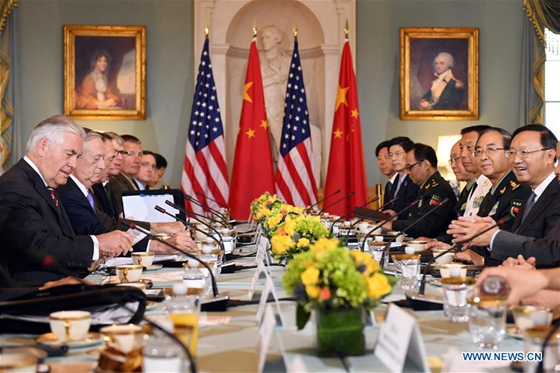The Sino-American security dialogue
- By George N. Tzogopoulos
 0 Comment(s)
0 Comment(s) Print
Print E-mail China.org.cn, June 28, 2017
E-mail China.org.cn, June 28, 2017
|
|
|
Chinese State Councilor Yang Jiechi (1st R) co-chairs a diplomatic and security dialogue with U.S. Secretary of State Rex Tillerson (1st L) in Washington D.C., the United States, on June 21, 2017. [Photo/Xinhua] |
More than two months ago, Presidents Xi Jinping and Donald Trump met in Mar-a-Lago, Florida, for the first moves towards a better understanding between their two countries.
The strengthening of dialogue has been a priority in assisting China and the U.S. to find a modus vivendi despite obvious differences, and the first China-U.S. Diplomatic and Security Dialogue took place a few days ago in Washington.
The significance of the initiative was outlined by the participation of State Councilor Yang Jiechi and Secretary of State Rex Tillerson as well as Secretary of Defense James Mattis.
For China and the U.S. to be talking about security at all can only be considered a breakthrough, because this issue had been lagging behind in comparison to economic relations, trade, culture and people-to-people exchanges.
There's no doubt the international community urgently needs Beijing and Washington to find common ground and cooperate in the field of diplomatic and security affairs, and the fight against terror perhaps constitutes the greatest priority.
During the recent dialogue meeting, Middle East issues in general and the situation in Afghanistan, Iraq and other regional scenes of conflict were on the agenda. Both sides agree Islamic State should be defeated; however, due to longstanding mutual suspicion, they don't often proceed together as much as they could and should.
From the Chinese perspective, cooperation in counter-terrorism has to be based on the principles of mutual respect, equal treatment and mutual benefit. And from an American perspective, the commitment to a policy that aims to expand cooperation with China where it is possible and also to narrow differences on key issues is obvious.
In fact, Assistant Secretary of State for East Asian and Pacific Affairs Susan Thornton clearly stated this in a special briefing. Within this context, the two states are prepared to deepen cooperation in common areas of humanitarian aid, disaster relief, anti-piracy and military medical assistance, and examine other confidence-building measures.
Notwithstanding the common will for joint steps in counter-terrorism and other military-related activities, the Diplomatic and Security Dialogue found the two countries separated by their approach to the South China Sea and the North Korea nuclear program.
To start with the former, Beijing strongly believes that only the countries directly involved should be engaged in negotiations to solve any disputes, or at least manage them in an efficient way.
This said, the stance of the Philippines under Rodrigo Duterte, who is slowly abandoning the policies of his predecessor Benigno Aquino III, cannot be ignored. By contrast, the U.S. lays emphasis in what it calls "freedom of navigation" operations that cause alarm in Beijing.
Speaking during a recent visit to China, the Commander of the U.S. Pacific Fleet, Admiral Scott Swift confirmed American policy, although saying it was not being largely promoted in public as before.
With reference to the North Korean crisis, China's eventual objective is the denuclearization of the Korean Peninsula. However, it prefers negotiations to take place under the "six-party talks" framework, and does not want to see the Pyongyang regime immediately collapse or be humiliated and the country and its people be damaged beyond repair.
By contrast, the U.S. insists a solution of the problem solely depends on more pressure to be exerted by the Chinese administration on Kim Jong-un. Beijing responds that it is not able to define Kim's future actions and that its policies vis-à-vis North Korea are in line with decisions of the UN Security Council.
Obviously, the current moment is complicated and emotional following the death of American student Otto Warmbier upon his return from imprisonment in North Korea.
It would have been unwise to expect China and the U.S. to solve their differences in one meeting. What is more important is that the two sides are working to guarantee that their bilateral relationship is advancing towards a healthy and stable direction.
In a sign that this is happening, Reuters reported that Trump's daughter Ivanka and her husband, White House senior adviser Jared Kushner, had been invited by the Chinese government to visit the country later this year, even before the president himself.
Constructive talks will follow on several new occasions. The G20 Hamburg summit in July provides a fresh opportunity for additional fruitful exchanges of views. Although Trump remains unpredictable and his foreign policies have not been completely formulated and understood yet, he is certainly more of a realist towards China today in comparison to the period between his election victory and his inauguration.
It will certainly be unprecedented for an American president, if he practically shows his openness to the "Belt and Road" Initiative, as it has begun to be discussed in the American media in the aftermath of the Dialogue.
George N. Tzogopoulos is a columnist with China.org.cn. For more information please visit:
http://www.china.org.cn/opinion/GeorgeNTzogopoulos.htm
Opinion articles reflect the views of their authors, not necessarily those of China.org.cn.







Go to Forum >>0 Comment(s)